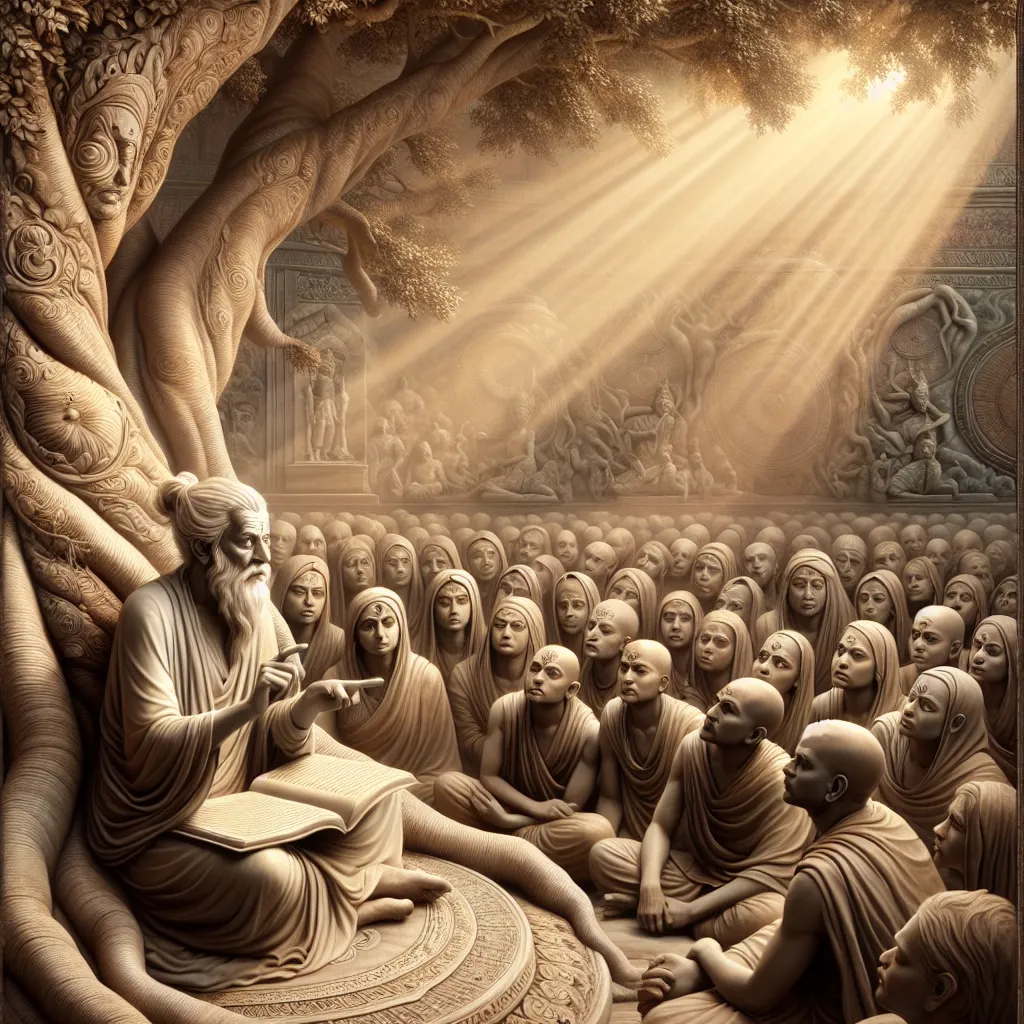
- Published on
- Authors

- Name
- You
The Role of the Guru: Spiritual Teachers and Guides in Hinduism
Introduction
Hinduism, one of the oldest living religions, has a deep-seated tradition of venerating the guru - a spiritual teacher or guide who illuminates the path to enlightenment. The Sanskrit word "guru" derives from "gu," meaning darkness, and "ru," meaning dispeller. Thus, a guru dispels the darkness of ignorance. This article explores the historical significance, the intricate relationship between gurus and disciples, and the mystical aspects supported by modern scientific parallels in the role of the guru within Hinduism.
Historical Significance
The Origin of the Guru Tradition
To understand the critical role of the guru, we must look back to the Vedic period. The guru-shishya (teacher-student) tradition forms the cornerstone of Hindu educational and spiritual systems. The Upanishads, ancient scriptural texts, emphasize the necessity of a guru to attain true knowledge.
| Era | Key Developments |
|---|---|
| Vedic Period | Establishment of guru-shishya parampara |
| Upanishadic Age | Emphasis on learning through direct transmission |
| Medieval Period | Bhakti movement and proliferation of spiritual gurus |
Prominent Gurus in Hinduism
Throughout history, several gurus have shaped Hindu thought. Adi Shankaracharya, for instance, refined Advaita Vedanta, while contemporary figures like Ramakrishna Paramahamsa and Swami Vivekananda brought spiritual wisdom to global audiences.
| Guru | Contribution |
|---|---|
| Adi Shankaracharya | Advaita Vedanta, re-establishing Vedic wisdom |
| Ramakrishna Paramahamsa | Universal love and religious tolerance |
| Swami Vivekananda | Bridging Eastern spirituality with Western scientific thought |
Guru-Disciple Relationship
Dynamics of the Relationship
The relationship between a guru and disciple is deeply sacred and personalized. It is a bond that transcends mere instruction, embodying mentorship, spiritual transmission, and personal transformation.
Elements of the Relationship
- Trust and Surrender: The disciple's faith and surrender to the guru are crucial.
- Guidance and Discipline: The guru provides tailored spiritual practices (sadhana) and disciplines.
- Transmission of Shakti: The guru imparts spiritual energy or shakti to the disciple.
Stages of Spiritual Growth
Under the guru's guidance, disciples progress through various stages of spiritual evolution.
| Stage | Description |
|---|---|
| Shravana | Listening to the teachings |
| Manana | Reflecting on the teachings |
| Nididhyasana | Deep, continuous meditation and assimilation of the teachings |
| Realization (Samadhi) | Achieving a state of direct spiritual experience and unity with the divine |
The Guru's Role in Spiritual Awakening
Awakening Through Knowledge and Science
Modern science increasingly echoes principles long held by mystical wisdom. Neuroplasticity, for instance, shows how mental training can physically alter the brain. Similarly, the guidance of a guru helps reshape neural pathways to foster spiritual insight.
| Scientific Concept | Mystical Parallel |
|---|---|
| Neuroplasticity | Rewiring through meditation and guidance |
| Quantum Entanglement | Non-duality and the interconnectedness of all things |
Case Study: Meditation and Cognitive Function
Research studies suggest that consistent meditation guided by a guru can enhance cognitive functions, reduce stress, and foster a profound sense of well-being.
Example Study:
- Title: "The Impact of Guided Meditation on Cognitive Clarity"
- Findings: Increased gray matter density in the brain regions associated with learning and memory.
Conclusion
The guru occupies a central role in Hinduism, not merely as a teacher but as a guide who brings disciples from darkness to light. This relationship is built on trust, discipline, and profound spiritual connection. As modern science begins to validate ancient wisdom, the teachings of the guru remain as vital today as they were millennia ago, bridging the gap between mystical traditions and advanced scientific understanding.
By seeking a guru, individuals embark on a transformative journey that unites the timeless spiritual insights of Hinduism with the progressive revelations of modern science, leading ultimately to spiritual awakening and enlightenment.
Further Reading
- Books: "Autobiography of a Yogi" by Paramahansa Yogananda
- Research Papers: "Neuroplastic Effects of Meditation" by Sara W. Lazar
Whether you are delving into spirituality or seeking the intersection of science and mysticism, the role of the guru in Hinduism offers invaluable insights into the journey of the soul towards enlightenment.
